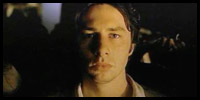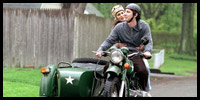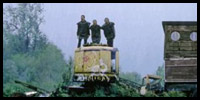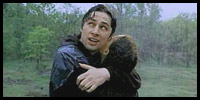
 |
|
Garden State (2004) Cast: Zach Braff, Natalie Portman, Peter Sarsgaard, Ian Holm, Alex Burns, Ann Dowd, Jean Smart, Michael Weston, Denis O'Hare, Debbon Ayer, Jackie Hoffman, Method Man, Amy Ferguson, Trisha Lafache, Ato Essandoh, Armando Riesco, Jim Parsons, Ron Leibman, Geoffrey Arend, Wynter Kullman 2004 – 109 minutes Rated: Reviewed by Dustin Putman, July 10, 2004.  Although NBC's "Scrubs" is currently one of the smartest network sitcoms, and lead star Zach Braff is the pivotal center that bounds its outlandishness in a cloak of potent reality, nothing the 29-year-old Braff has done in the past even hints at what "Garden State" proves he is capable of. A remarkably auspicious writing-directing debut, "Garden State" won a passionate, acclaimed response at the 2004 Sundance Film Festival, and for understandable reason. Braff astonishingly juggles many different tones and genres—the film is, among other things, an intuitive character study, a zany comedy, a drama of deep-seated wounds and past regrets, a rumination on finding oneself after years of aimless confusion, and one of the most heartbreakingly believable romances of the year. In the end, the viewer is left with a penetratingly affecting, one-of-a-kind motion picture, a movie unlike any other he or she has ever seen.
Although NBC's "Scrubs" is currently one of the smartest network sitcoms, and lead star Zach Braff is the pivotal center that bounds its outlandishness in a cloak of potent reality, nothing the 29-year-old Braff has done in the past even hints at what "Garden State" proves he is capable of. A remarkably auspicious writing-directing debut, "Garden State" won a passionate, acclaimed response at the 2004 Sundance Film Festival, and for understandable reason. Braff astonishingly juggles many different tones and genres—the film is, among other things, an intuitive character study, a zany comedy, a drama of deep-seated wounds and past regrets, a rumination on finding oneself after years of aimless confusion, and one of the most heartbreakingly believable romances of the year. In the end, the viewer is left with a penetratingly affecting, one-of-a-kind motion picture, a movie unlike any other he or she has ever seen.
 The death of his parapalegic mother in a freak bathtub accident is the catalyst for 26-year-old Andrew Largeman's (Zach Braff) return to his New Jersey hometown. His somewhat estranged psychiatrist father, Gideon (Ian Holm), sees Andrew's few days in town from Los Angeles (he is a waiter and struggling actor whose only claim to fame is playing a mentally challenged character in a made-for-TV movie) as a way to try and reconnect with him. Meanwhile, Andrew—nicknamed "Large"—reunites with some old high school buddies, including gravedigger Mark (Peter Sarsgaard), who still lives with his mother (Jean Smart), discovering that no one he grew up with has really found their place in "the real world." Large's chance meeting with the lovely Sam (Natalie Portman), an acknowledged pathological liar with a warm heart and an irresistibly free-spirited personality, paves the way for a long overdue epiphany: the medications he has been on nearly all his life, drugs that were supposedly helping him, have seriously hindered his decision-making and emotions. Now that he is off of the drugs for the first time in nearly twenty years, Large is startled to see the world around him with a newfound clarity. Although invigorated by this newfound freedom and further bolstered by his burgeoning time spent with Sam, he can't help but be alarmed by where he stands in his life.
The death of his parapalegic mother in a freak bathtub accident is the catalyst for 26-year-old Andrew Largeman's (Zach Braff) return to his New Jersey hometown. His somewhat estranged psychiatrist father, Gideon (Ian Holm), sees Andrew's few days in town from Los Angeles (he is a waiter and struggling actor whose only claim to fame is playing a mentally challenged character in a made-for-TV movie) as a way to try and reconnect with him. Meanwhile, Andrew—nicknamed "Large"—reunites with some old high school buddies, including gravedigger Mark (Peter Sarsgaard), who still lives with his mother (Jean Smart), discovering that no one he grew up with has really found their place in "the real world." Large's chance meeting with the lovely Sam (Natalie Portman), an acknowledged pathological liar with a warm heart and an irresistibly free-spirited personality, paves the way for a long overdue epiphany: the medications he has been on nearly all his life, drugs that were supposedly helping him, have seriously hindered his decision-making and emotions. Now that he is off of the drugs for the first time in nearly twenty years, Large is startled to see the world around him with a newfound clarity. Although invigorated by this newfound freedom and further bolstered by his burgeoning time spent with Sam, he can't help but be alarmed by where he stands in his life.
 For post-graduate twenty-somethings, the future is often seen as a frightening, uncertain time. With the safety of college behind them, they must next figure out what they want to do with their life and how they plan on making a living—a conundrum, indeed, if they have no idea how to fulfill such a requirement. This very confusing notion is at the core of "Garden State," one that writer-director-star Zach Braff finds crystal-clear, emphatic relevance in. For those audience members going through this period in their life, "Garden State" will undoubtedly seem to be speaking to them directly, and even for those who have already struggled through the experience and remember its emotional difficulty, they will return the film a knowing nod and, hopefully, a great deal of understanding.
For post-graduate twenty-somethings, the future is often seen as a frightening, uncertain time. With the safety of college behind them, they must next figure out what they want to do with their life and how they plan on making a living—a conundrum, indeed, if they have no idea how to fulfill such a requirement. This very confusing notion is at the core of "Garden State," one that writer-director-star Zach Braff finds crystal-clear, emphatic relevance in. For those audience members going through this period in their life, "Garden State" will undoubtedly seem to be speaking to them directly, and even for those who have already struggled through the experience and remember its emotional difficulty, they will return the film a knowing nod and, hopefully, a great deal of understanding.
 Braff captures his affectionate but uncompromisingly real characters with a level of pronounced depth and sympathy rarely afforded cinematic creations. These people—particularly Large, Sam, and Mark—are not Screenwriting 101 knock-offs; they exist naturally and their actions met with stunningly honest fluidity. Their character traits involve a lot of quirks and tics, but their offbeat nature is, for once, not a means to set up plot devices and cheaply predictable developments. They simply are who they are, flaws and all. Sam, for example, is found to suffer from epilepsy; it is with a splendidly assured hand that Braff devolves such information without making it lead to an overwrought, last-act sequence where she has a seizure. Likewise, Braff trusts the viewer's intelligence, never feeling the need to spell out what is occurring, and what these events or maladies mean to the characters; in lieu, he shows us through subtle, legitimate means that would genuinely arise out of real life, and the film is all the more deeply moving because of it. Some scenes and their payoff—a spontaneous hug goodbye between Large and Sam's kind mother (Ann Dowd); a quiet bathtub conversation between Large and Sam about the pain and imperfections everyone must deal with in their lives; an unclear scavenger hunt for an item with more significance than Large realizes; a moment of pure, unadulterated freedom at the bottom of an abandoned, rain-swept quarry—hold unexpected, devastating power without every needing to explain their meaning or go for a sentimental music cue. Braff is content to remain low-key and unforced, and the lasting effect his story and characters have on the viewer prosper because of it.
Braff captures his affectionate but uncompromisingly real characters with a level of pronounced depth and sympathy rarely afforded cinematic creations. These people—particularly Large, Sam, and Mark—are not Screenwriting 101 knock-offs; they exist naturally and their actions met with stunningly honest fluidity. Their character traits involve a lot of quirks and tics, but their offbeat nature is, for once, not a means to set up plot devices and cheaply predictable developments. They simply are who they are, flaws and all. Sam, for example, is found to suffer from epilepsy; it is with a splendidly assured hand that Braff devolves such information without making it lead to an overwrought, last-act sequence where she has a seizure. Likewise, Braff trusts the viewer's intelligence, never feeling the need to spell out what is occurring, and what these events or maladies mean to the characters; in lieu, he shows us through subtle, legitimate means that would genuinely arise out of real life, and the film is all the more deeply moving because of it. Some scenes and their payoff—a spontaneous hug goodbye between Large and Sam's kind mother (Ann Dowd); a quiet bathtub conversation between Large and Sam about the pain and imperfections everyone must deal with in their lives; an unclear scavenger hunt for an item with more significance than Large realizes; a moment of pure, unadulterated freedom at the bottom of an abandoned, rain-swept quarry—hold unexpected, devastating power without every needing to explain their meaning or go for a sentimental music cue. Braff is content to remain low-key and unforced, and the lasting effect his story and characters have on the viewer prosper because of it.
 The impassioned performances—Braff has culminated a brilliantly eclectic cast—raise the bar even further. Zach Braff is unaffected and palpably charismatic, lovable without asking to be, as Andrew Largeman, a young man who finally decides to take control of his own life. When first seen living in Los Angeles and still on his meds, Large is a mental mess—he is mistreated at his serving job at a fancy restaurant, he leaves the gas station without taking the pump out of his gas tank, he fantasizes about calmly sitting on an otherwise frantic airplane about to crash. In other words, he is emotionally dead inside. Once home in New Jersey and without the medication to fall back on, Large gradually rediscovers what it is like to think, and feel, and care about things, even the most mundane. Braff brings such freedom to his character, and such an understated fondness for him, that it is impossible not to get involved in his plight.
The impassioned performances—Braff has culminated a brilliantly eclectic cast—raise the bar even further. Zach Braff is unaffected and palpably charismatic, lovable without asking to be, as Andrew Largeman, a young man who finally decides to take control of his own life. When first seen living in Los Angeles and still on his meds, Large is a mental mess—he is mistreated at his serving job at a fancy restaurant, he leaves the gas station without taking the pump out of his gas tank, he fantasizes about calmly sitting on an otherwise frantic airplane about to crash. In other words, he is emotionally dead inside. Once home in New Jersey and without the medication to fall back on, Large gradually rediscovers what it is like to think, and feel, and care about things, even the most mundane. Braff brings such freedom to his character, and such an understated fondness for him, that it is impossible not to get involved in his plight.
 Matching Braff is a beautifully effervescent, funny, and touching Natalie Portman, freed from the blue-screen restraints of "Star Wars: Episode One" and "Episode Two" and once again able to show why she has been considered one of the very best young actresses working today. For Portman, her exhilarating performance as Sam joins her previous work in 1996's "Beautiful Girls" and 1999's "Anywhere But Here" as her most joyful and accomplished, to date. Portman brings uncountable layers to Sam, a simultaneous sadness and invigorating glee for living, all the while striking up a miraculous, soulful chemistry with Braff that makes their romance all the more urgent and luminous. Please give this exceptional talent an Oscar, already. Supporting work is exemplary across the board, each one given at least a moment or two to shine: Peter Sarsgaard (2003's "Shattered Glass") is Large's best friend, Mark, who hides a painful secret from his past; Ian Holm (2004's "The Day After Tomorrow") is Large's misunderstanding father; and Ann Dowd (1999's "Shiloh 2: Shiloh Season") is Sam's mom, whom doesn't quite realize the connection she makes with Large precisely when he needs it most.
Matching Braff is a beautifully effervescent, funny, and touching Natalie Portman, freed from the blue-screen restraints of "Star Wars: Episode One" and "Episode Two" and once again able to show why she has been considered one of the very best young actresses working today. For Portman, her exhilarating performance as Sam joins her previous work in 1996's "Beautiful Girls" and 1999's "Anywhere But Here" as her most joyful and accomplished, to date. Portman brings uncountable layers to Sam, a simultaneous sadness and invigorating glee for living, all the while striking up a miraculous, soulful chemistry with Braff that makes their romance all the more urgent and luminous. Please give this exceptional talent an Oscar, already. Supporting work is exemplary across the board, each one given at least a moment or two to shine: Peter Sarsgaard (2003's "Shattered Glass") is Large's best friend, Mark, who hides a painful secret from his past; Ian Holm (2004's "The Day After Tomorrow") is Large's misunderstanding father; and Ann Dowd (1999's "Shiloh 2: Shiloh Season") is Sam's mom, whom doesn't quite realize the connection she makes with Large precisely when he needs it most.
 "Garden State" is the kind of near-perfect treasure of a movie that you want to hug and never let go. Not only is there unmeasured poignancy in the journey Large goes through to reclaim a hold on his life, and a transcendent love story between Large and Sam, and a wholly unpredictable plot trajectory to what occurs, and how things happen, but, technically speaking, one would never be able to guess this is a low-budget independent feature. The use of songs, much like 2004's "The Girl Next Door," are a vital character in and of themselves, with choice tracks by such important artists as Nick Drake, Coldplay, The Shins, and Frou Frou, the latter of whom's "Let Go" masterfully underscores the sublime final scene. Likewise, the resplendent, classy cinematography by Lawrence Shin (2004's "Club Dread") attracts and fulfills through its meticulous use of long shots and different film speeds; each one evokes a different mood, and each mood aids in putting the viewer right alongside the characters in their various surroundings. "Garden State" is a beaming, unforgettable little masterpiece, creatively alive and emotionally intimate at the same time. For Zach Braff, this is just the first of what now promises to be an encouraging filmmaking career, and for 2004, this is easily one of the year's finest motion pictures.
"Garden State" is the kind of near-perfect treasure of a movie that you want to hug and never let go. Not only is there unmeasured poignancy in the journey Large goes through to reclaim a hold on his life, and a transcendent love story between Large and Sam, and a wholly unpredictable plot trajectory to what occurs, and how things happen, but, technically speaking, one would never be able to guess this is a low-budget independent feature. The use of songs, much like 2004's "The Girl Next Door," are a vital character in and of themselves, with choice tracks by such important artists as Nick Drake, Coldplay, The Shins, and Frou Frou, the latter of whom's "Let Go" masterfully underscores the sublime final scene. Likewise, the resplendent, classy cinematography by Lawrence Shin (2004's "Club Dread") attracts and fulfills through its meticulous use of long shots and different film speeds; each one evokes a different mood, and each mood aids in putting the viewer right alongside the characters in their various surroundings. "Garden State" is a beaming, unforgettable little masterpiece, creatively alive and emotionally intimate at the same time. For Zach Braff, this is just the first of what now promises to be an encouraging filmmaking career, and for 2004, this is easily one of the year's finest motion pictures.
|
© 2004 by Dustin Putman |














